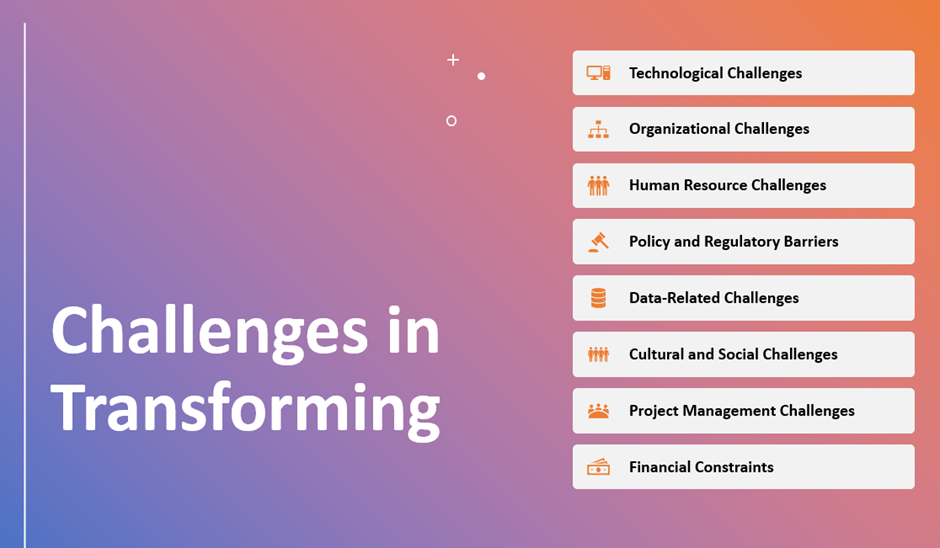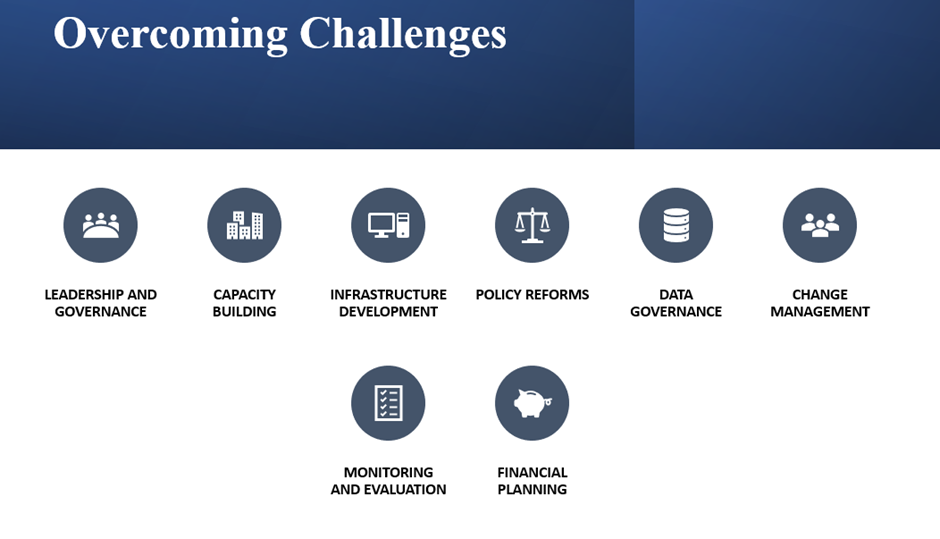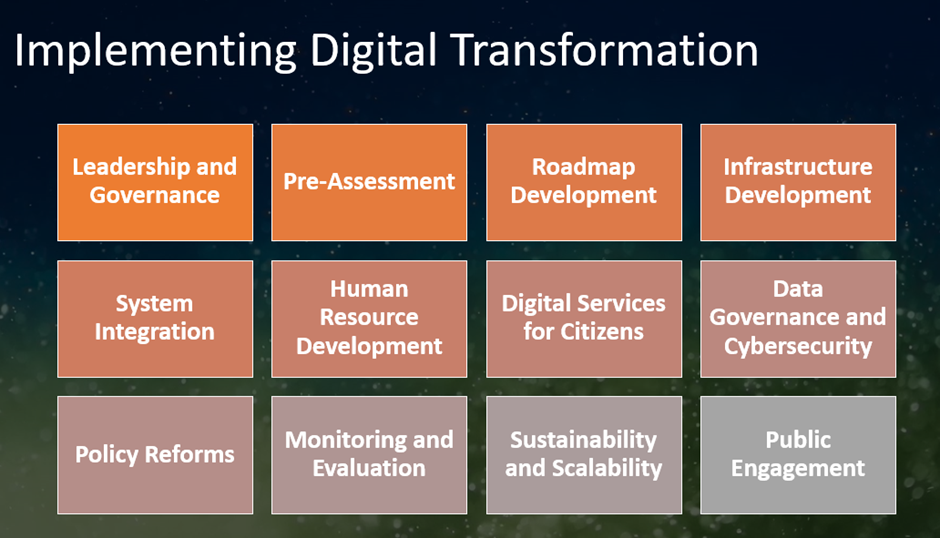The Bangladesh Secretariat faces several challenges including outdated technology, bureaucratic resistance, limited IT infrastructure, and a lack of skilled workforce. Poor interdepartmental communication, data fragmentation, and inadequate leadership further complicate modernization. Financial constraints and outdated policies also slow progress, while public mistrust and cybersecurity risks exacerbate the situation. Overcoming these issues is crucial to improving transparency, efficiency, service delivery, strengthening governance, and public trust in digital services.
The transformation of the Bangladesh Secretariat through digital modernization has the potential to significantly improve governance, efficiency, transparency, and citizen satisfaction. Administrative functions like file management, correspondence, and human resource processes, the Secretariat can streamline workflows, reduce delays, and improve decision-making can be solved by digitizing. The adoption of an e-file system will facilitate faster document movement, transparent tracking of approvals, and easier retrieval of records. Additionally, automating routine tasks will free up employees to focus on more strategic responsibilities, leading to improved productivity and faster service delivery.
Furthermore, the digital transformation would enhance the delivery of government services to citizens, making processes like permit issuance, grievance redressal, and access to public records more accessible through online portals. By implementing digital tools for financial management, such as budgeting, expenditure tracking, and e-payments, the government can ensure greater accuracy, transparency, and efficiency in managing public funds. Improved interdepartmental coordination, enhanced security, and the ability for employees to work remotely will further increase the Secretariat’s operational efficiency. Ultimately, this transformation will lead to cost savings, increased public trust, and better alignment with Bangladesh’s long-term development goals, creating a more responsive and accountable government.
The Bangladesh Secretariat’s digital transformation presents an exciting opportunity to modernize key government services, improve efficiency, and enhance transparency. By leveraging technology, the Secretariat can streamline various functions, benefiting both government employees and citizens.

Administrative Services
Administrative functions can achieve greater efficiency through the adoption of advanced digital tools:
- E-File Systems: Implement electronic file systems to enable seamless tracking and sharing of government documents.
- Optical Character Recognition (OCR): Digitize archived records for efficient retrieval and streamlined data management.
- AI-Driven Automation: Leverage artificial intelligence to automate administrative tasks, including document approvals, scheduling, classification, and anomaly detection.
- Blockchain Technology: Ensure tamper-proof records and secure audit trails to enhance transparency and accountability.
- Natural Language Processing (NLP): Extract actionable insights from vast unstructured data sets for informed decision-making.
- Human Resource Management: Modernize HR functions by digitizing attendance tracking, leave requests, payroll, and performance management systems.
Financial Services
The financial management of government operations can be revolutionized with:
- Budgeting and Expenditure Tools: Use digital solutions for accurate budgeting and real-time expenditure tracking.
- E-Payments: Facilitate online payment systems for taxes, fees, and fines to improve accessibility and convenience for citizens.
- Financial Transparency: Implement real-time reporting systems to enhance visibility and accountability in public finances.
Public Works and Infrastructure Management
Infrastructure management can be optimized by:
- Land Record Digitization: Establish digital systems to manage land records and government asset inventories efficiently.
- E-Procurement: Introduce platforms that ensure transparent bidding and vendor management.
- Digital Project Tracking: Use tools to monitor infrastructure projects’ progress and resource utilization effectively.
Legal and Regulatory Services
Modernizing legal and regulatory functions can streamline governance:
- Searchable Legal Databases: Digitize laws, policies, and circulars for easy access and reference.
- Compliance Tracking: Automate systems to ensure regulatory adherence across departments.
- Online Dispute Resolution Platforms: Simplify and expedite conflict resolution processes.
Security and Emergency Services
Enhanced security and emergency management can be achieved through:
- Incident Reporting Platforms: Deploy digital platforms to enable quick reporting and response to security breaches.
- Disaster Recovery Systems: Use cloud-based systems to ensure service availability during emergencies.
- Advanced Security Technologies: Employ AI, blockchain, and encryption to safeguard sensitive government documents.
Citizen-Centric Services
Empowering citizens through digital tools will improve accessibility and satisfaction:
- Grievance Redressal Systems: Develop centralized platforms for real-time complaint submission and tracking.
- E-Governance Websites: Provide citizens with easy access to public records and government services.
- Digital Permit Issuance: Accelerate processing times for permits and licenses through online systems.
- Service Portals: Offer applications for welfare programs, pensions, and other services through dedicated portals.
Policy and Decision Support
Policymaking can be enhanced by leveraging data-driven insights:
- Data Analytics Platforms: Inform decisions using analytics tools that provide actionable insights.
- Real-Time Dashboards: Monitor project progress and departmental KPIs effectively.
- Public Consultation Platforms: Foster citizen engagement in policy development through online participation tools.
Interdepartmental Coordination
Collaboration across departments can be streamlined with:
- Integrated Communication Tools: Adopt solutions for real-time communication and coordination.
- Project Management Software: Simplify workflows and ensure effective task management.
- Digitized Meeting Tools: Facilitate scheduling, minute-taking, and documentation in digital formats.
Environmental and Sustainability Services
Support sustainability goals through:
- Paperless Initiatives: Promote eco-friendly practices by reducing reliance on physical documents.
- Energy Management Tools: Optimize energy usage in government offices using digital solutions.
- Green Project Dashboards: Track and manage environmentally sustainable projects.
Capacity Building and Training
Government workforce capabilities can be enhanced with:
- E-Learning Platforms: Deliver continuous training programs online.
- Certification Programs: Offer digital certifications to upskill employees.
- Knowledge-Sharing Tools: Facilitate collaboration and sharing of best practices across departments.
The governments will not only modernize internal processes but also foster greater transparency, efficiency, and citizen satisfaction, setting the stage for sustainable, technology-driven governance by digitizing these services.

Challenges in Transforming the Bangladesh Secretariat
- Technological Challenges
The Secretariat’s reliance on outdated legacy systems creates difficulties in integrating with modern digital platforms, requiring substantial resources. Inadequate IT infrastructure, such as poor internet and unreliable power, limits the deployment of digital systems. Cybersecurity threats, including data breaches, must be addressed, alongside ensuring interoperability between departments with differing data formats and standards. - Organizational Challenges
Resistance to change among officials accustomed to traditional methods is a significant barrier. A lack of clear leadership and ineffective coordination across departments leads to delays. Silos within the organization further hinder collaboration, making it essential to establish unified leadership and promote interdepartmental communication. - Human Resource Challenges
Many employees lack the digital literacy needed to use modern tools, and there is resistance to learning new skills. As the workforce transitions to digital workflows, concerns about job displacement due to automation arise. Addressing these challenges requires focused training programs and a robust change management approach. - Policy and Regulatory Barriers
Outdated policies and regulations may obstruct digital workflows and e-governance. Delays in passing legislation and ensuring compliance with international standards, such as GDPR, present additional challenges. Reforming policies and aligning them with the digital transformation goals will be crucial. - Data-Related Challenges
Fragmented data across systems and inconsistent data storage practices hinder integration and decision-making. To comply with data protection regulations, privacy and security concerns over sensitive data must be addressed. Establishing a centralized data governance framework is necessary to resolve these issues. - Cultural and Social Challenges
Cultural resistance to digital transformation and a lack of awareness about its benefits pose significant hurdles. Public mistrust of digital systems due to fears of inefficiency and bias must be addressed. The digital divide, especially in rural areas, can also exclude some citizens from digital services, requiring increased access to technology. - Project Management Challenges
Effective project management is essential for success, but a lack of detailed planning and coordination can lead to inefficiencies. Conflicting priorities between stakeholders and pilot fatigue can hinder progress. Strong project management practices, clear prioritization, and stakeholder coordination are necessary to overcome these challenges. - Financial Constraints
The initial investment needed for infrastructure upgrades, software acquisition, and training is substantial, while ongoing maintenance costs pose a long-term challenge. A focus on the short-term costs rather than the long-term benefits of digital transformation could deter investment. Securing funding and demonstrating cost savings are critical for success.

Overcoming Challenges
Through emotional intelligence, empathy, and compassionate leadership, the transformation can succeed by fostering a collaborative, supportive environment for change, ensuring smooth adaptation, and promoting sustained innovation in the Bangladesh Secretariat.
- Leadership and Governance
Establish a dedicated transformation task force with clear authority and accountability. Appoint digital transformation champions in each department to lead and motivate change with empathy and emotional intelligence. - Capacity Building
Launch extensive training programs to improve digital literacy and IT skills. Encourage change adoption through incentives and show compassion toward employees transitioning to new systems. - Infrastructure Development
Invest in modern IT infrastructure and secure connectivity by leveraging cutting-edge technologies such as artificial intelligence (AI), big data, cloud computing, blockchain, and advanced cybersecurity solutions. Foster collaboration with private sector partners through public-private partnerships (PPPs) to share costs and expertise, while ensuring equitable access and addressing regional disparities in digital infrastructure. - Policy Reforms
Update legal frameworks to support digital workflows and data protection. Simplify procurement processes to speed up implementation, fostering inclusivity and trust. - Data Governance
Develop a centralized database with standardized formats and enforce data protection measures with NLP, ML, and AI. Ensure compliance with global standards, safeguarding citizens’ data with integrity.
Change Management
Run awareness campaigns to emphasize the benefits of digital transformation. Gradually introduce changes with empathy, addressing concerns and building confidence in the new systems. - Monitoring and Evaluation
Implement clear KPIs to track progress and measure success. Use feedback mechanisms to refine processes and continuously improve, ensuring coordination and adaptability to emerging needs. - Financial Planning
Secure funding through international development agencies or multilateral organizations (e.g., World Bank, ADB). Prioritize cost-effective, sustainable solutions like open-source software, promoting financial responsibility and transparency.

Implementing Digital Transformation of the Bangladesh Secretariat
The digital transformation of the Bangladesh Secretariat requires a strategic, phased approach. The key steps involved are:
- Leadership and Governance: Appoint a dedicated leadership team to drive the transformation, including a Chief Transformation Officer (CTO) and digital champions in each department.
- Pre-Assessment: Evaluate existing systems, engage stakeholders, and conduct a SWOT analysis to identify areas for digital improvement.
- Roadmap Development: Create a phased implementation plan with specific milestones, prioritize high-impact initiatives, and address risks (e.g., cybersecurity).
- Infrastructure Development: Invest in modern IT infrastructure, and cloud computing, and collaborate with private partners for cost-effective solutions.
- System Integration: Integrate legacy systems with modern platforms, establish data standards, and shift to cloud & AI-based solutions for efficiency.
- Human Resource Development: Provide extensive training, promote digital literacy, and implement change management strategies with empathy and emotional intelligence.
- Digital Services for Citizens: Launch e-government platforms, run awareness campaigns, and enable digital grievance management for increased transparency.
- Data Governance and Cybersecurity: Standardize data formats, implement strong data protection policies, and establish cybersecurity frameworks to safeguard sensitive information.
- Policy Reforms: Update laws and regulations to support digital workflows, streamline procurement processes, and ensure compliance with international standards.
- Monitoring and Evaluation: Define KPIs, establish a feedback loop, and use data analytics to monitor progress and make necessary adjustments.
- Sustainability and Scalability: Promote eco-friendly practices and ensure the scalability of digital systems to accommodate future growth.
- Public Engagement: Keep citizens informed about the transformation, address their concerns, and build trust through transparency.
The digital transformation will enhance governance, improve public services, foster trust, and drive operational efficiency, aligning with Bangladesh’s long-term development goals by following this comprehensive approach.
Key Benefits for Stakeholders
The Bangladesh Secretariat’s digital transformation offers significant benefits to various stakeholders, enhancing the efficiency of government operations and the quality of services provided to citizens.
The shift to digital platforms promises faster and more reliable service delivery for citizens. Simplified processes will reduce bureaucratic hurdles and facilitate access to government services while ensuring greater transparency and convenience. Citizens will have improved access to information, reducing the time spent on administrative tasks.
For government employees, the transition to digital systems will simplify workflows, reduce repetitive tasks, and improve overall efficiency. Adopting modern tools and technologies will create opportunities for skill enhancement, boosting professional development. With these improvements, employees are likely to experience increased job satisfaction due to the reduction in manual, time-consuming processes.
From an economic perspective, digital transformation can contribute to improved investor confidence, as the government’s modernization aligns with the needs of a digital economy. The reduction in administrative overheads, through the automation and digitization of services, will not only cut costs but also increase the efficiency of government functions, leading to a more competitive and productive environment.
Overall, the digital modernization of the Bangladesh Secretariat promises to deliver substantial benefits, driving progress for citizens, government employees, and the broader economy.
Final Remark
The digital transformation of the Bangladesh Secretariat presents a significant opportunity to enhance governance, elevate service provision, and foster public confidence. Strategic interventions targeting technological, organizational, and cultural obstacles can pave the way for operational efficiency and alignment with Bangladesh’s developmental objectives.
Through visionary leadership, strong infrastructure, and ongoing public involvement, the Secretariat has the potential to become a beacon of e-governance, establishing a blueprint for countries worldwide aiming for digital advancement.

Engr. Johnny Shahinur Alam
Technologist and ICT & Digital Transformation Specialist














Leave a comment